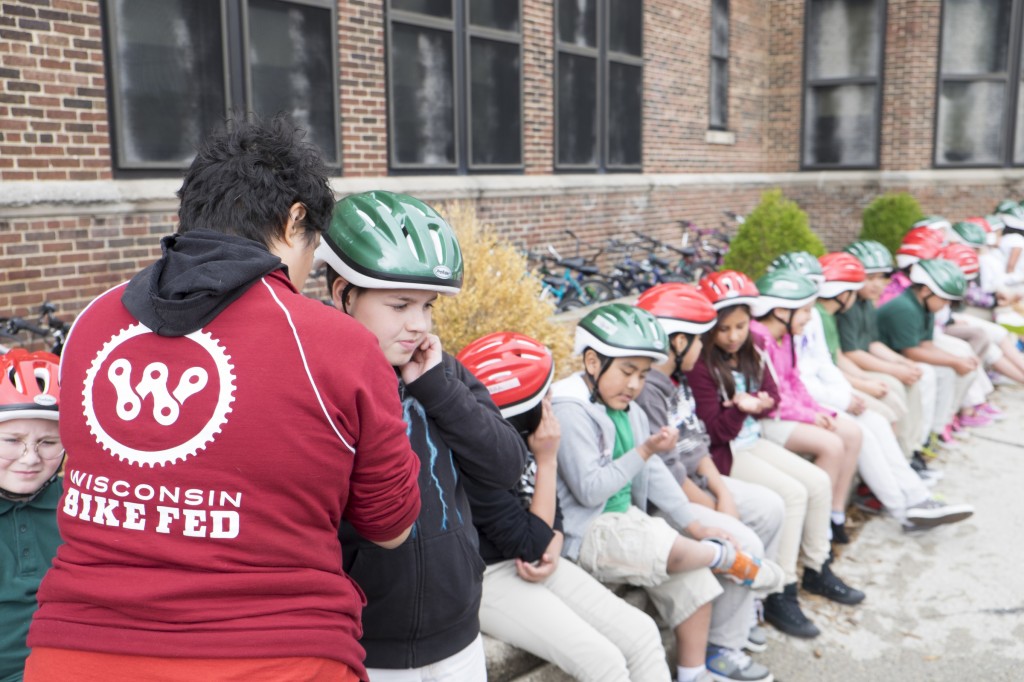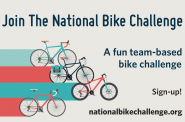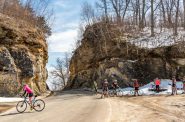Walker Ends State Funding for Biking Program
His proposed budget eliminates all state funding for Transportation Alternatives Program.
The tragic death of cyclist James Shafer in Waushara County over Valentines Day weekend – the first-such fatality of 2015 – might have been prevented had the road he’d been riding on had a paved shoulder or paved trail. Paving that shoulder and building new trails to prevent future tragedies, improve health and boost local economies are somewhat less likely to happen under Governor Scott Walker’s proposed state budget.
A key part of his proposed 2015-2017 budget involves the Transportation Alternatives Program (TAP), one of the few programs at the federal or state level to help fund projects for cycling and walking. Walker has proposed eliminating all state support for TAP, which stood at $2 million over the last two years. (It had been more in previous years.) His action would leave the federal money in the program. That’s about $14 million over two years. So, all told, the governor’s 100 percent cut in state funding for TAP would mean a 14 percent cut to the entire program. On a percentage basis, the complete elimination of state funding for this program dwarfs the much-discussed, 13 percent cut in state funding for the UW System.
Injured?
In the current grant cycle about two-dozen grants were awarded to local governments while several dozen were turned down. There’s much more demand for the program than available resources even under its current funding level.
To make matters worse, in the most recent federal transportation act, passed in 2012, the overall funding for TAP (which had been three separate programs) was reduced. So, the governor’s budget is really a double-whammy.
Since the inception of these programs (which have had various names over the years) in 1993, about 700 projects have been funded all over Wisconsin.
Here are some examples of projects that were awarded in 2014:
- Sidewalk improvements in the Village of Oseola.
- The Waukesha to Brookfield Connector bike and pedestrian trail.
- The City of Beloit’s Powerhouse Riverwalk.
- Additions to the Capital City Trail in Madison.
- The VIP Trail extension in La Crosse.
- Bicycle & Safe Routes to School planning efforts in Milwaukee, Oak Creek and West Central and North Central Wisconsin.
The program requires a 20 percent local match, which creates local buy-in and helps the money go further. So, this has really been a great partnership between the national, state and local governments. The governor would take the state out of the partnership entirely from a financial perspective, yet the state would still approve the projects.
One of the arguments against TAP is that funding for it comes from federal and state gasoline taxes and, since bicyclists and pedestrians don’t pay those taxes, projects that benefit them shouldn’t be funded from gas tax revenues. So, let’s address those concerns head on.

Future bicycle safety classes are threatened by the proposed state budget cuts to the Transportation Alternatives Program.
First, most of us who ride bikes also drive cars. We do pay gas taxes; we just don’t pay them when we bike, although even there many of us drive to locations where we do recreational cycling.
Second, as motorists we don’t pick up the full tab for driving either. Most roads and streets are under local jurisdictions and so their building and repair is handled through the local property tax, not gas taxes.
Third, as cyclists we put virtually no wear and tear on roads. For those of us who commute or do errands using our bikes we’re contributing to society by saving our streets, taking up less space on those streets, creating less demand for expensive car parking and contributing nothing to air and water pollution.
At only $2 million, TAP accounts for far less than one percent of the almost $1.4 billion the Wisconsin DOT says it needs over the next two years to make up the difference between current revenues and road construction and maintenance needs. As such, it’s important to note that eliminating this funding was not the idea of the DOT. It was not in the department’s proposed budget. Instead, the cut came directly from Gov. Walker.
So, where do we go from here? We are working towards a budget amendment to restore the $2 million to be offered in the Joint Finance Committee sometime this spring. We’ll keep you updated as that vote gets closer.
This article was originally published by the Bicycle Federation of Wisconsin.
Bike Czar
-
Join a Bike Ride Under the Polish Moon
 Jun 1st, 2018 by Dave Schlabowske
Jun 1st, 2018 by Dave Schlabowske
-
9 Reasons to Join National Bike Challenge
 May 4th, 2018 by Dave Schlabowske
May 4th, 2018 by Dave Schlabowske
-
Biking Through the Mindoro Cut
 Apr 27th, 2018 by Dave Schlabowske
Apr 27th, 2018 by Dave Schlabowske






















This has nothing to do with money and everything to do with politics. Believe it or not, a big portion of Walker’s base views bicyclists as threat to our way of life – the culture wars in full display. Stupid commie bicyclists! Don’t you know… all Americans should be fat, drunk and stupid.
Stupid statements. charge a tax on each bike sold to pay for those trails. I ride almost every day 9 months of year and know that the statements about Walker supporters are stupid.
Ok….. maybe someone with more insight into this issue could comment on WCD’s proposal to tax bicycles sales for bike bath construction and maintenance. Is the DOT responsible for other non-driving infrastructure like sidewalks? Should we tax shoes to pay for those? Would there be enough revenue from bike sales to pay the $2M + share of state costs for bike infrastructure? It just seems shortsighted to me. People will ride bikes whether there are safe and separate paths or not. This could significantly impact biker safety. The 1.4% of total budget seems like it’s a good investment in both safety and for those that choose not to drive everywhere they go. I stand by my intial statement that it was a petty move by the Walker administration to win political points with a far right constituency that rejects anything coming from moderate, resonable people.
So just how many bikes do you buy a year? I have had the same one for many many years, you f#@king moron.
David, as of 2011, Wisconsin was collecting $468 million in sales taxes from motor vehicle sales each 2 years. Newly elected Gov. Walker proposed taking half this money out of General Revenue (where it pays for things like schools or parks) and put into the Transportation Fund (to pay for highways). He proposed phasing this in over 10 years (from 2011–2021).
This plan went nowhere, but instead Walker’s next budget just took much the same money directly out of the General Fund and put it into highways. Starting in FY 2013, 0.25% of ALL General Fund revenue (sales tax, income tax, etc) flows directly into the Transportation Fund. This is not a one-time transfer; it is permanent. In the current biennium (2013–15), this is estimated at $182.3 million—almost as much as the $234 million Walker originally wanted to work up to by 2021.
http://www.jsonline.com/news/statepolitics/120883939.html
I estimate that Wisconsin’s 5% sales tax on bicycles, parts, and accessories comes to about $5.8 million a year, or $11.6 million per biennium. (Bike sales—including parts and accessories—totaled $5.8 billion nationwide in 2013, and I assumed 2% of those sales were in Wisconsin.) If half that money were redirected to bicycle projects (just like Walker wanted to do with motor vehicle sales tax money), that would more than fund this program. Even if parts and accessories were excluded, half the sales on new bikes alone would bring in much more than the needed $1 million a year.
So my response to Mr. Dohnal (WCD) is that bicyclists are ALREADY paying for this $1 million/year program through $5.8 million in sales taxes.
I agree Tom. I just think it’s a great investment. I’m sure WCD would say the diversion from the general fund for bike paths would be a tax increase. I believe all the sales tax from bicycles and related equipment goes to the general fund. It’s petty politics. Walker wins votes by cutting out any investment in transportation other than roads. It’s a cultural war. And btw, WCD knows that it would be next to impossible to add a tax on bikes for paths. Good luck with that. Furthermore, paths allow for walking, jogging, rollerblading and other activities. Maybe we should tax athletic equipment WCD?
I really hate to see completely win-win programs contributing to long-term cultivation and growth being put at constant risk (or in this case, confirmation) of destruction. Nobody wins when campaigns revolve around promises of eradicating good things.
Disgusting. Walker really is the bottom of the barrel.
This noble fight is the civil rights movement of this generation. You want bike funding, but instead of working to put Democrats in Madison to grant your every demand, you pound sand about Scott Walker. Governor Fitzgerald will be even worse to you.
“As cyclists, we do no wear and tear on the road” is just silly. Bike paths, off road wear areas, and all walkways need maintenance at some point. Bikes affect the flow of traffic and do cost us with congestion in the space they use and the vehicles they hold up. On top of it all, bicyclists aren’t even required to carry insurance for any damage they incur.